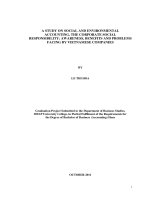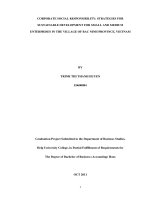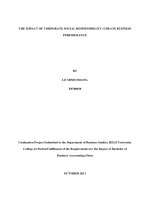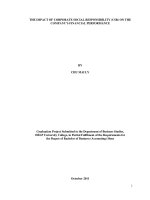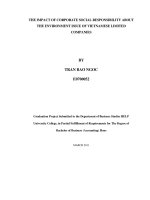the impact of corporate social responsibility about the environment issue of vietnamese limited companies
Bạn đang xem bản rút gọn của tài liệu. Xem và tải ngay bản đầy đủ của tài liệu tại đây (806.74 KB, 67 trang )
THE IMPACT OF CORPORATE SOCIAL RESPONSIBILITY ABOUT
THE ENVIRONMENT ISSUE OF VIETNAMESE LIMITED
COMPANIES
BY
TRAN BAO NGOC
E0700052
Graduation Project Submitted to the Department of Business Studies HELP
University College, in Partial Fulfillment of Requirements for The Degree of
Bachelor of Business (Accounting) Hons
MARCH 2011
2
DECLARATION OF ORIGINALITY
AND WORD COUNT
I hereby declare that the graduation project is based on my original work except for
quotations and citations which have been duly acknowledged. I also declare that it has not
been previously or concurrently submitted for any other course/degree at Help University
College or other institutions. The word count is 9397 words.
______________________
TRAN BAO NGOC
28 March, 2011
3
ACKNOWLEDGEMENT
First of all, I would like to express my sincere appreciation to my supervisor, Dr. Le Van
Lien International School, Vietnam National University Hanoi who has guided me
throughout this thesis. Because of his constant guidance, insightful suggestions, and
constructive ideas, those can be helpful and encourage for me to complete my project.
Furthermore, I also would like to express my thank to Ms. Sumathi and Ms. Shenba, Help
University College, who initiated the project and give so much instruction and support
durng this process.
Next, I would like to acknowledge to two managers who join in my interview: Mr Tran
Thanh Hai- Direct Manager of Thach Bich Mineral Water company and Mr Nghuyen Van
Thuan- Manager of Human Resouces in Banh mut Keo Ha Noi spent their precious time
to help me to conduct the interview. In adition, I also would like to extend my special
thanks to managers, Government Staffs, my friends, and other people who have help me
to carry out the survey because they gave me their support, interest and valuable hints.
Without them, I can not complete my project.
Lastly, I would also like to extend my heartfelt gratitude to my family who always are on
my side for loving me, supporting me and beliving in me.
TRAN BAO NGOC
4
THE IMPACT OF CORPORATE SOCIAL RESPONSIBILITIES ABOUT THE
ENVIRONMENT ISSUE OF VIETNAMESE LIMITED COMPANIES.
By
TRAN BAO NGOC
MARCH 2011
Supervisor: Dr. Le Van Lien
ABSTRACT
CSR and it components have become important issues in the world also in Vietnam.
Vietnam is developing country with developing economy, thus CSR and environment
issue are the key term for the country to develop sustainably. This paper aims to discover
how limited companies in Vietnam view CSR and environment duties, whether those have
any effect on the Vietnam citizens behavior, how they can have impact in Limited
compay, and the attitude of Vietnam Governemtn staff toward them. After we can see
that, there is strong support for CSR and its component: environment from managers and
a growing awareness among citizens and Government staffs. Nevertheless, there is
expectation gap between how manager think and how they act because there are lack of
honesty CSR disclosure from firm or manager, inactive support actions from consumers
due to the barriers in living expenses, and the way company chose to communicate CSR.
In contrast, with highly positive attitude toward the important impact of CSR and
environment duties and the strong belive finding from the survey have drawing potential
bright future for CSR and environment duties in Vietnam.
5
TABLE OF CONTENTS
DECLARATION OF ORIGINALITY AND WORD COUNT 2
ACKNOWLEDGEMENT 3
ABSTRACT 4
TABLE OF CONTENTS 5
LIST OF FIGURES 7
LIST OF ABBREVIATIONS 8
1. INTRODUCTION 9
1.1. CSR and CSR about environment issue in the world 9
1.2. CSR and CSR about environment issue in Vietnam 9
1.3. Government actions 10
1.4. CSR practice and challenges 11
2. LITERATURE REVIEW 12
2.1. Definition and conceptualization of CSR 12
2.1.1. Carroll's 1979-1991 conceptualization 13
2.2. Responsibility of the firm 15
2.3. Limited companies 16
2.4. CSR reporting 17
2.5. Hypothesis 17
2.5.1. Management‟s attitude toward CSR and environment duties 17
2.5.2. Citizen‟s attitude toward CSR information and environment duties 18
2.5.3. Government staffs‟ attitude toward CSR and environment duties 19
3. RESEARCH METHODOLOGY 20
3.1. Research objective 20
3.2. Problem statement 21
3.3. Reasearch methodology 21
3.4. Data source 21
3.4.1. Primary data 21
3.4.2 Secondary data 22
3.5. Research method 23
3.6. Research tool 23
3.6.1. Questionaire 23
6
3.6.2. Personal interview 23
3.6.3. Annual report …………………………………………………………………………………………………………23
3.7. Data collection 24
3.8. Sampling 24
3.8.1. Sample population 24
3.8.2. Sample frame 24
3.8.3. Sample size 24
3.8.4. Sample technique 24
3.9. Limitation 24
4. FINDINGS AND ANALYSIS 26
4.1. Management 27
4.1.1. Findings from questionnaire survey 27
4.1.2. Actual CSR disclosures by firms 31
4.1.3. Findings from managers interview 33
4.1.4. Overall evaluation of management‟s responses 34
4.2. Citizens 35
4.2.1. Findings from questionnaire survey 35
4.2.2. Overall evaluation of citizen‟s responses 37
4.3. Government staff 40
4.3.1. Findings from questionnaire survey 40
4.3.2. Overall evaluation of Government staff‟s responses 43
4.4. Overall discussion 44
5. CONCLUSION 47
REFERENCES 51
APPENDIX A: QUESTIONNAIRE 55
APPENDIX B: STATISTICAL TEST 60
7
LIST OF FIGURES
Figure 2.1. CSR basic knowledge ……………………………………………………….13
Figure 2.2. A hierarchy of CSR (adapted from Carroll, 1991) 13
Figure 2.3. The CSP Model (adapted from Wood, 1991) 16
Figure 4.1. Respondents 26
Figure 4.2. Citizens and Government staff categories 26
Figure 4.3. Distribution of responses from management survey 27
Figure 4.4. Distribution of responses from management survey (percentage) 29
Figure 4.5. Descriptive statistics 1 (management survey) 30
Figure 4.6. Descriptive statistics 2 (management survey) 31
Figure 4.7. Distribution of responses from citizen survey 35
Figure 4.8. Distribution of responses from citizen survey (percentage) 37
Figure 4.9. Descriptive statistics 1 (citizen survey) 38
Figure 4.10. Descriptive statistics 2 (citizen survey) 39
Figure 4.11. Distribution of responses from Government staff 40
Figure 4.12. Distribution of responses from Government staff (percentage) 41
Figure 4.13. Descriptive statistics 1 (Government staff survey) 42
Figure 4.14. Descriptive statistics 2 (Government staff survey) 42
8
LIST OF ABBREVIATIONS
CSR Corporate Social Responsibility
IQR Inter-Quartile Range
VSA Vietnamese Accounting Standard
9
1. INTRODUCTION
1.1. CSR and CSR about environment issue in the world
Nowadays with the booming of Internet and Information Technology (IT), the world
become closer and the economy in over the world also become more global. As the result,
to gain advantages of this chance all companies in the world need to have the perfect
image to the society to ensure that they can run their business well with the support of
public. As the result, they spend a lot of money to achieve that and responsible for society
that means a huge number of money are used to complete their Corporate Social
Responsibility. For example, General Electrics uses more than two billion USD per year
for ensure its CSR. In addition the most important aspect need to consider when talking
about CSR is environment aspect. It can not be denied that nowadays the environment of
the world become more and more polluted by the human harm thus to have better imagine
in society all companies need also protect our environment. Typically, Uno one of the
biggest company in Japan has applied recycled goods program. The other example is
Coca- cola the biggest beverage company has many activities for community: recycling
bottle, distributing its product in environment friendly water bottled.
1.2. CSR and CSR about the environment issue in Vietnam
In contrast, Vietnam is a developing country and it has a potential economy with the
growth rate is high thus this country also try its best to join in the world‟s economy to
have more advantages and privilege. After a lot of negotiation and efforts, now it has
10
already been formal members of Word Trade Organization (WTO) which open a new gate
for all companies in this country try their best to do efficiently and effectively to take part
in the global economy and make their development better with more profitable chances.
With this global trend, and the rapidly development in this harmony of economy,
Vietnamese companies need to care about a lot of issues. Among a lot of issue the main
issue which they need to care most is CSR. However in Vietnam, CSR is a new concept.
It newly introduced by internal corporations sourcing in Vietnam under the form of Code
of Conduct or social standard requirements since Vietnam dos not have much experience
about this filed. Presently, a lot of events: Vedan polluted Thi Vai river, China milk
contain minamin, conflict between parties inside company make this term especially
environment aspect become more necessary for all sustainable economies in Vietnam.
1.3. Govenrment action
Because of the above necessary, Vietnamese Government have already taken actions to
ensure that all companies in over the country must to complete their CSR especially
environment issue. For example, Vietnamese Government use “Sustainable development
and protecting the environment” which set in the national strategy SRV 1993:45, along
with most nations in the world (O‟Rourke,1995). They also made new regulations,
“Environmental Protection Law and the Vietnam Agenda 21” for sustainable
development. Besides, the Government also established Environmental Police and special
fees levied on the emission of waste water to strengthen enforcement measures against
companies that polluted.
11
1.4. CSR practice and challenge
Vietnam had CSR Awards, which was organized by Vietnam Chamber of Commerce and
Industry, Ministry of Labor-Invalids and Social Affairs, Vietnam Ministry of Industry and
Trade since 2005, together with Vietnam Leather & Footwear Association, and The
Vietnam National Textile and Garment Group, in order to honor enterprises and all
limited companies that effective done of CSR and environment duties. In 2006, there are
50 Vietnamese companies in field: Leather & Footwear Association, Textile and Garment
that join in that. According to PhD Doan Duy Khuong - Vice-Director of Vietnam
Chamber of Commerce and Industry, “CSR and its component have become necessary
requirement for each company, if the company does not embrace CSR, they can not
approach the global market” (Saga Vietnam, 2008).
However, in Vietnam, there are still a lot of difficulties in applying CSR and complete
environment duties. Firstly, there is not enough law and regulation to enforce limited
companies and other kind of companies to complete their duties to the society. The
evaluations of CSR effectuation are set in Code of Conduct and standards such as
SA8000, WRAP, ISO 14000, GRI, etc. Furthermore, there are not common deal between
Government and International department about the way to do those. Thus, ties are only
among export or import companies or companies' rules. Secondly, there is also a lack of
knowledge from limited companies' knowledge about CSR and environment duties. The
do not have enough knowledge and experience. Besides, we have some limited companies
that have started to produce friendly environment goods such as: Thach Bich, Hai Ha
tokobuki….however, those actions have mainly been based on company‟s nature rather
than voluntary that complies with the business statement and company‟s image
12
2. LITERATURE REVIEW
2.1. Definition and conceptualization of CSR
In the fact, to define the content of CSR we have various way to do that but the following
definition ifs one of the most common way to define it. CSR “is also known as corporate
conscience, corporate citizenship, responsible business, sustainable responsible business
(SRS), or corporate social performance, is a form of corporate self- regulation integrated
into a business model. Ideally, CSR policy would function as a built-in, self-regulating
mechanism whereby business would monitor and ensure its support to law, ethical
standards and international norms. Consequently, business would embrace responsibility
for the impact of its activities on the environment, consumers, employees, communities,
stakeholders and all other members of the public sphere. Furthermore, CSR- focused
businesses would proactively promote the public interest by encouraging community
growth and development and voluntarily eliminating practices that harm the public sphere,
regardless of legality. Essentially, CSR is the deliberate inclusion of public interest into
corporate decision making and the honoring of a triple bottom line: people, planet, profit.”
The following figure represent this idea.
13
Figure 2.1
In literature, there are various conceptualization of CSR have been developed, in this
paper, I will introduce some concepts of CSR such as: Carroll (1979) four part definition
of CSR, Argandona and Hoivik (2010)‟s ethical concept.
2.1.1. Carroll 1979- 1991 conceptualization
Figure 2.2
Carroll introduced CSR into four part: economic responsibility, legal responsibilities,
ethical responsibilities, and discretionary in 1979. Firstly, he concerned about economic
14
responsibilities which represents the principal roles of business organizations is not only
making goods and services but also making profit that means business organization was
the basic economic unit before it was anything else.
Secondly, legal responsibilities of the firm were talked, represents the expectation of
society that all activities of company need to take care of law, and fulfill their economic
target set by Government. “Fair operation” was established by lawmakers is the basis for
the view of “codified ethics” affect legal responsibility (Carroll, 1979). In fact, companies
can take advantages of law and regulation but it is not easy to know whether it is fair or
not. Hence, the laws are used when the tolerable business behavior are limited, but they
neither define ethics nor do they “legislate morality” (Solomon, 1994).
In fact, to fulfill with the limitation of law, the ethical responsibility have been depended
on by the companies. Thus, it is not necessary to make ethical responsibility that based on
human principals and rights commitment become law, but the societal members want that
(Novak, 1996). In contrast, the firms might face up with difficulties to deal with the ethic
because of various definitions.
Lastly, when talk about model of Carroll we can not miss discretionary responsibility
which includes activities that relates to the society‟s expectation of businesses to become
good citizens. The difference between ethical responsibility and that is that the public‟s
expectation is not based on ethical or moral sense under this area. The community need
companies to join in the process of building and enhancing the society, however if it does
not satisfy such desires, it will become unethical firm. This responsibility is more
voluntary for the business even there is always expectation that the business provide it.
15
For example: reduce the greenhouse effect, increase the literacy rates. This responsibility
may be conflict with the statement of company.
While economic responsibility lays on the foundation, this category is the peak of the
pyramid. Under this opinion, economic and legal responsibilities are socially required,
ethical responsibility is socially expected, and discretionary responsibility is socially
desired (Windsor, 2001).
From up to now, this theory is useful and effective but it also has some limitations: three
dimension are complex and not easy to test and it need to base on other theory to be better
for all companies to apply. Clarkson (1995)
2.2. CSR report:
Nowadays, with the booming of Internet and Information Technologythe world become
closer as the result, the economy in the world also become lobal. Thus the demand for
implement CSR and Environment duties_ one way in which organizations use to
communicate information about social and environmental issues to different stakeholders.
CSR reports can be mandatory, solicited or voluntary (Van der Laan, 2004; Woodward et
al, 1996) is much higher than before as it can enhance the image and reputation of
companies in society. However there are not consistent form or standard for all companies
in the world to follow thus all managers of companies try their best to enhance their
reputation by misstating these report.
16
2.3. Responsibility of the firm
Beside the normal activities of a firm, it needs to complete it social responsibility. What is
it? “Social responsibility is the principle that companies should contribute to the welfare
of society and not be solely devoted to maximizing profits. This responsibility can be
“negative”, meaning there is exemption from lame or liability, or it can be “positive”,
meaning there is a responsibility to act beneficently (proactive stance). Let‟s check the
following diagram to see the relationship between companies and environment.
Figure 2.3 :
17
2.4. Limited company
In addition, to complete this paper we must know what limited company is. A limited
company is a type of business entity. In the United Kingdom or Republic of Ireland it is a
corporation with shareholders whose liability is limited by share (Ltd), which is the most
common form of privately held company. Setting up as a limited company is an attractive
opinion for many people as, unlike sole proprietorships, personal assets are distinct from
company finances.”
2.5. Hypothesis:
2.5.1. Management‘s attitude toward CSR and Environment issue
It can not be denied that there are many different ways to define CSR and it component:
environment by firms. They can be the way to increase efficiency and effectiveness in
operation and performance, or some companies commit to CSR and environment duties
just because they simply believe that it is morally right. However, according to a survey
among corporate managers, there are none company have those. It can not be denied that
many companies focus mainly not on action only in saying about that. Although there are
some companies make good progress in implement CSR and environment duties, it is not
easy CSR become fully adopted by business (Franklin, 2008). Thus, integrating CSR and
environment duties in day-to-day operation is a key issue for management.
However, there are also some challenges which can affect the attitude of manager. We
have inherent risk that may occur if social responsibility is not undertaken such as higher
18
borrowing costs, fines and public boycott on companies‟ products. If social responsibility
is properly taken, there are not only future costs are saved but also the competitive
advantage and reputation can be gained through disclosing information on CSR.
Besides, the general feelings in the society also influence managers‟ attitude toward. The
expectations society put on firm to be social responsible will influence the managers to
have action toward CSR to meet those expectations. So, there is reasonable to assert that
manager have positive attitude toward CSR and CSR reporting in order to maintain the
“license to operate”. Thus, the following hypothesis is developed:
: Managers’ attitude toward CSR and environment issue is positive
2.5.2. Citizen‘s attitude toward CSR and Environment issue
They are people in developing country thus they only care about how they can remain the
stable budget in other word they only focus on price of goods not the moral issue. That
means their attitude toward CSR and environment duties are not strong as managers but
they still know the important of them hence the following hypothesis is develop:
: Citizens’ attitude toward CSR and environment issue is positive
19
2.5.3. Government staff‘s attitude toward CSR and Environment issue
Government staff are agency of the Government they directly control the process of
completing CSR and environment of all companies thus the realize clearly the important
of them. Hwever they only are the agency of Government thus they do not have the right
to make the policies. As a result, they show their neutral but positive trend attitude. We
might conclude that:
: Citizens’ attitude toward CSR and environment issue is positive.
20
3. RESEARCH METHODOLOGY
3.1. Research objective
The first aim of this project is to provide a theoretical framework for understanding the
completed concept of corporate social responsibilities and other relevant components
under this area to build framework for all companies to have better understanding about it
and they can avoid breaching any issue related to CSR.
The second aim of this project is to evaluate the impact of CSR especially environment
issue in Vietnamese companies mainly in limited companies. In other word, when these
firms do CSR, what they can achieve and what they can take advantage of.
The last aim of this project is to obtain from the view of all Vietnamese companies within
the industry that means it is designed to explore how the Vietnamese companies and
limited companies relating to the corporate social responsibilities. This project also tries to
find out the components that impact on this awareness. Many questions can rise: do all
limited company respond to corporate social responsibilities or they try to avoid this to
have more profit? If they respond to do it, how they do well or not?
3.2. Problem statement
I, what is the fact of conducting corporate social responsibilities in Vietnamese
companies?
II, When and how the issue relating the term “corporate social responsibilities” penetrates
deep into Vietnamese economy?
21
III, When are the impact of corporate social responsibility to the limited company?
IV, How do those firms operating in Vietnam respond to CRS? Are they good, enough or
not?
3.3. Research methodology
This study includes qualitative research. The qualitative research is conducted through the
interview with managers and reviewing the annual reports of companies as well as is
carried out by the questionnaire survey on managers, citizen around limited companies
and staff of Government department which have responsibility of CSR.
3.4. Data source
In order have all needed information, it is very necessary to use both secondary data and
primary data.
3.4.1. Primary data
The first source will be used here is primary data_ “are originated by a researcher for the
specific purpose of addressing the problem at hand” (Amstrong & Kotler, 2007). One of
the advantages of primary data collection method is to provide the appropriate information
that match with the requirements of this project. There are many way to collecting
primary data such as: questionnaires, interviews, focus group interviews, case-studies,
diaries, observations, critical incidents, portfolio…. This is the most reliable form of data
as with this kind of data researcher may have direct interaction with other parties. Beside
the advantages, there are also some disadvantages of primary data such as: expensive and
22
time consuming, false result when not conduct properly, demanding more skill and
expertise of researchers.
3.4.2. Secondary data
The second source will be used is secondary data_ are those data that have already been
collected for purposes other than the problem at hand. This source of data will provide the
overall picture about application Corporate Social Responsibilities in Vietnam and
example of implementing Corporate Social Responsibility in Vietnamese Limited
Companies. The secondary data will be collected at the low cost and quickly from the
relating sources such as: books, websites, newspaper, magazines and so on… Besides
these advantages, this ways also contain disadvantage. For example, the needed
information may not available. It is very difficult for researcher to get all information they
need in secondary data or when the data is available it may usefulness.
3.5. Research method
- For primary collection: as it is descriptive information thus I use survey research such as
questionnaire and personal interview to have better result.
- For secondary collection: I will carry out the limited companies annual reports and
journal information in Internet, magazine and book.
23
3.6. Research tool
3.6.1. Questionnaire
There are three patterns of survey (Appendix A): managers, citizen around limited
companies and staff of Government department which have responsibility of CSR. Survey
pattern designed for managers include 7questions.
The pattern for citizen around limited companies contains 7 questions.
For staff of Government department which have responsibility of CSR, the pattern
including 8 questions.
All of three survey patterns use three points Likert scales (1= “ strongly disagree”, 5=
“strongly agree”) to represent the extent to which the respondents think about CSR and its
environment issue. There is also the additional opinion part which is optional for people to
write.
3.6.2. Personal interview
In this paper I will conduct interview in managers from chosen companies and staff of
Government department which have responsibility of CSR. To complete this, I will use 6
questions for managers and Government staff to see how well those companies complete
their CSR especially environment issue and the attitude of Government staff and
managers about this issue.
3.6.3. Annual reports
The annual reports of 10 chosen limited companies also are examined to find out what is
the fact of disclosure CSR and environment issue in each company.
3.7. Data collection
The survey question for Government department are sent to Environmental and Economic
Police Department of Dong Da district, phong tai nguyen moi truong quan dong da,
students of international school, Vietnam National University Ha Noi (IS- VNU) and
Hanoi Tourim Coledge, customers 3 restaurants and 2 nescesary shops.
The survey questions for management and interview requested letter for mnagers are sent
to ten companies in two sectors: beverage industry and food industry.
In ten companies, six of them are Banh mut keo Ha Noi, Kinh Do, Haihakotobuki, Huu
Nghi, Trung Thanh Co. Ltd and Halong CanFood Co.Ltd. There are four manufactures of
beverage industry: Thach Bich, Quang Hanh, Kim Boi, and Lavie.
24
3.8. Sampling
3.8.1. Sample population
The target population is citizen in Ha Noi and Ho Chi Minh City.
3.8.2. Sample frame
The sample frame is the managers, citizen and Government staff in Ha Noi and Ho Chi
Minh City.
3.8.3. Sample size
80 management questionnaire patterns, 150 citizens questionnaire patterns and 80
Government staffs questionnaire pattern have been sent out. There are also 10 requested
letters for interviews are sent to managers of 10 limited companies.
3.8.4. Sample techniques
The sampling was conducted based on two techniques: convenience sampling and
judgment sampling. I will use convenience sampling for questionnaire survey and
judgment sampling for managers‟ interview.
3.9. Limitation
When conducting a research, we will face with some following problems. Firstly, the
problem can be found in survey pattern. Sometime, because people may not have enough
knowledge, they can not answer the question. Besides, although they do not know the
issue or understand the question, they still answer the question to have better imagine
which can cause the wrong result for conclude the research. In addition, people may be
unwilling to respond to unknown interviewer or about issues they consider sensitive. And
people may refuse to spend time to answer the questions (Amstrong & Kotler, 2007).
Secondly, the problem also can be found in finding annual report of the chosen firms. It
can not be denied that all companies want to have perfect imagine in society thus they try
their best to enhance their strength and decrease their weakness. As the result, when
25
interview comes to ask them about needed information they will not willing to provide
and interviewer can not be allowed to catch to those information to hide their weak.
Lastly, when I take sample I only focus on the small area (Dong Da district), thus my
conclusion may be right for this area but not reflect the overall trend of whole country.
